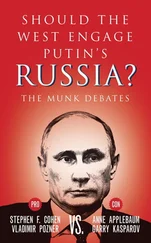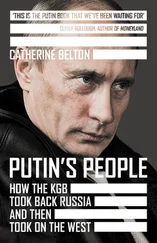But Andropov would not be given long to show what course he would set for the Soviet ship of state. In fact, his initial actions—raiding movie theaters for people shirking work, enforcing labor discipline—betrayed a petty, fussy cast of mind, not the broad horizons of a reformer. He had served a little more than a year when he suffered renal failure that first debilitated him, then took his life. It is the great paradox of Andropov’s life that his kidney problems had caused him to travel to the south of Russia to take the waters. On his sojourns there he became friendly with the local party boss, who in time became his protégé and whom Andropov introduced to the highest political circles in Moscow. His name was Mikhail Gorbachev.
Putin joined Andropov’s KGB in 1975 as the Apollo and Soyuz spacecraft linked up in space. It was the height of the euphoria of détente, a policy of rapprochement and the relaxing of tensions that Nixon and Brezhnev had launched in the early seventies. Like the “reset” under Putin, détente would end in suspicion, recrimination, and invasion—that of Afghanistan in late 1979.
Not that the KGB itself ever took détente all that seriously. In fact, during Putin’s first year at work in the Leningrad KGB, it was involved in a complex, risky, and ultimately highly successful operation directed against the American consulate in Leningrad. “Beginning in 1976, the KGB successfully installed sophisticated electronic eavesdropping equipment and burst transmitters inside 16 IBM Selectric typewriters used by the staffs of the Moscow embassy and Leningrad consulate, which copied everything being typed on the machines, then periodically broadcast their take to KGB engineers manning listening posts just outside…. In the end, the NSA concluded that the Soviet eavesdropping operation had most likely compromised every document typed on these 16 electric typewriters over a period of eight years from 1976 to 1984.” [72] “Soviet Cold War Tapping of the US Embassy in Moscow. A Post-Mortem,” September 15, 2012. See also Sharon Maneki, “Learning from the Enemy: The Gunman Project,” National Security Agency, 2012.
Putin at this time was a low-level operative, fresh from law school with a quick six months’ training behind him. But he was working in the field of counterintelligence. On both sides, it was assumed that certain embassy, consulate, and mission personnel were spies, but the question always remained, precisely which ones? To determine that was the task of counterintelligence. The material gleaned from the bugging of the electric typewriters would have been valuable in determining which of the Leningrad U.S. consulate’s personnel were intelligence officers. At the least, Putin’s task would have been facilitated by this information, and he would also have shared in the general rise in esprit de corps that a successful operation always brings to an organization.
The KGB was on a roll. On September 7, 1978, on a crowded London street, Georgi Markov, a defector who broadcast for the BBC’s Bulgarian radio service, often ridiculing the Bulgarian Communist regime, was assassinated with a poison (ricin) pellet fired from a miniaturized gun in the tip of an umbrella, a masterstroke of disguise in forever rainy London. Coincidentally, or not coincidentally, the date was also the birthday of the Bulgarian Communist dictator Todor Zhivkov, who must have been gladdened by this gift. Coincidentally, or not coincidentally, the assassination of the gadfly journalist Anna Politkovskaya would take place on Putin’s birthday.
Putin was in his element. The USSR may have been run by an increasingly doddering and sclerotic Leonid Brezhnev, but the KGB was vigorous and flush with success. Penetration of the enemy’s embassies and crafty assassination in the name of the cause—what could be better? Since he was in his element, he thrived and so came to the attention of the people in foreign intelligence, the classiest and most coveted branch of service, since it meant foreign postings, action on the front line, access to goods. He was called in by the foreign-intelligence people for a series of conversations. They liked what they saw and sent him to Moscow for a year’s worth of advanced training at the Dzerzhinsky KGB Higher School. Named for Felix Dzerzhinsky, often called with jocular affection “Iron Felix,” the founder of the first Soviet secret police, the school specialized in “skills enhancement” [73] www.agentura.ru/english/dossier/fsb/academy/
and had itself suffered greatly in the purges of 1937–38, when practically the entire teaching staff had been shot.
Nowadays, in one measure of progress, the KGB Higher School, a sprawl of yellow-brick buildings in southwest Moscow, is so famed for its computer experts that the lampposts outside the institute’s grounds are festooned with posters offering high-paying jobs in IT.
Nineteen seventy-nine, the year Putin spent immersed in his studies and training at the KGB Higher School, was a time of tectonic shifts within the Islamic world, and between the Western and Islamic worlds. The Iranian Revolution ousted the pro-Western shah and replaced him with a theocratic government. Radicals seized the holy places of Mecca, and the Saudis could not expel them without outside, i.e., French, help. In late December the USSR invaded Afghanistan in what would prove a protracted, failed, and fatal war, instrumental in the collapse of the system and, ultimately, in the rise of Vladimir Putin.
After returning to Leningrad from Moscow, his skills enhanced, Putin worked for three and a half years in the First Directorate, intelligence. Or did he? Some observers maintain that Putin also spent time in Directorate 5, which was charged with crushing dissent.
Andropov strove for “the destruction of dissent in all its forms” and, foreshadowing Putin, declared that “the struggle for human rights was a part of a wide-ranging imperialist plot to undermine the foundations of the Soviet state.” [74] Andrew and Mitrokhin, The Sword and the Shield , p. 7.
He was, no doubt, sincere. Andropov had seen what had happened in Hungary. A small discussion group named after nineteenth-century poet Sandor Petofi begins considering reformist ideas and the next thing you know security officers are hanging from lampposts.
Two figures dominated the opposition landscape: the writer Aleksandr Solzhenitsyn and Andrei Sakharov, creator of the Soviet H-bomb and leader of the human rights movement. In 1971 an attempt had been made on Solzhenitsyn’s life in a Moscow store, where he was smeared with a gel most likely containing ricin from the KGB’s poison factory. He became violently ill, but Solzhenitsyn, who had survived World War II, the Gulag, and cancer, wasn’t easy to kill. In early 1974 the KGB simply put him on a plane and exiled him to the West.
Sakharov, however, was a trickier business for the party and the KGB, which never acted in important matters without directives from the party. Of course, the KGB had ways of getting the party to do what it wanted, like feeding the leadership false or misleading information, as Andropov is believed to have done during the Prague Spring, which he wanted crushed at once. Sakharov had made the Soviet Union a nuclear power and had three times been awarded the Hero of Socialist Labor, one of the country’s highest civilian awards. In 1968, the year of the Prague Spring, The New York Times had published the complete text of Sakahrov’s long essay “Reflections,” which grappled with coexistence in a hostile nuclear world.
Andropov believed that there was still hope for Sakharov and suggested in a 1968 report to the Central Committee that Sakharov be called in for “an appropriate conversation.” [75] Gregory Freeze et al., ed., The KGB Files on Andrei Sakharov (Waltham Mass.: Andrei Sakharov Archives, Brandeis University / Yale University Press, 2005), pp. 25–26.
However, Sakharov, a shy but fearless man, was already well beyond persuasion or threat. Two years later Andropov informed the Central Committee that it was “advisable to install secret listening devices in Sakharov’s apartment.” [76] Ibid., p. 37.
In April 1971 Andropov reported without a trace of irony: “Meeting regularly with anti-Soviet individuals, some of whom are mentally ill, SAKHAROV looks at the world around him mainly through their eyes. It seems to him that he is constantly subjected to provocations, surveillance, eavesdropping, etc.” [77] Ibid., p. 58.
Читать дальше
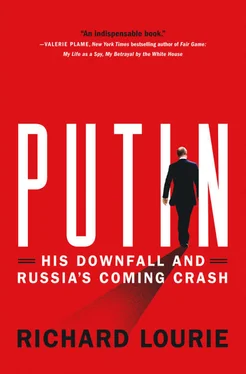

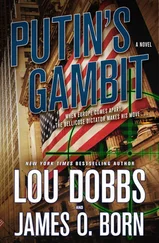
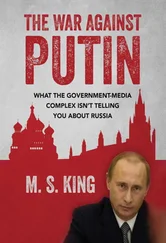

![Stephan Orth - Behind Putin's Curtain - Friendships and Misadventures Inside Russia [aka Couchsurfing in Russia]](/books/415210/stephan-orth-behind-putin-s-curtain-friendships-a-thumb.webp)

